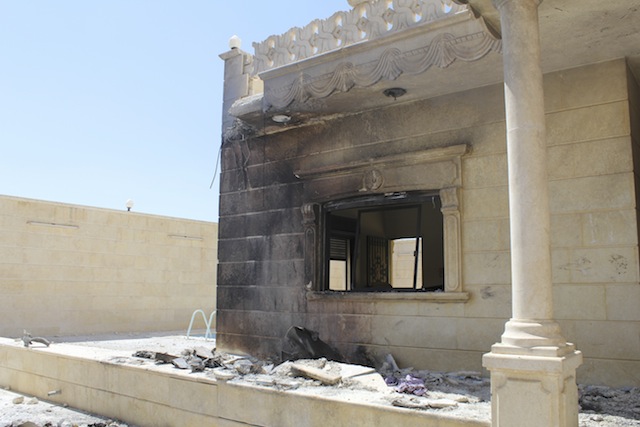Since 2010, Human Rights Watch has been calling on governments to review the 30-year-old international protocol on incendiary weapons to better protect civilians, but its message sharpened considerably ahead of the annual meetings of the Convention on Conventional Weapons held at the United Nations in Geneva on 14-15 November 2013. “Where’s the outcry?” the non-governmental organization asked as it issued a report documenting more than 50 Syrian government attacks using incendiary weapons since November 2012.
Syria’s airstrikes using incendiary weapons in or near populated areas violate international humanitarian law, or the laws of war, because they are inherently indiscriminate.
Protocol III of the 1980 Convention on Conventional Weapons (CCW) bans the use of air-delivered incendiary weapons in areas with “concentrations of civilians.” As of October 25, a total of 107 countries – including all five permanent members of the United Nations Security Council – were party to the protocol, but not Syria.
Representatives from least two dozen countries attended a briefing convened by Human Rights Watch during the CCW meeting to present its memo to delegates on Syria’s use of incendiary weapons. The room was absolutely silent when the brief, but hard-hitting video was shown as delegates watched with stunned looks, horrified by what they saw.
Two days later–on 14 November 2013–a dozen countries condemned Syria’s use of incendiary weapons during the general statements section of the Convention on Conventional Weapons meeting: Austria, Canada, Croatia, Ecuador, France, Germany, Ireland, Lithuania, Netherlands, Norway, Switzerland, and USA.
All condemned the use of incendiary weapons in Syria. The United States said “we have seen the disturbing reports that incendiary weapons may have been used against civilians in Syria. We strongly condemn any intentional targeting of civilians.” Norway commended Human Rights Watch “for bringing horrific reality to our attention” and Austria described the memo as “disturbing evidence” that “has raised serious questions on the application of international humanitarian law.”
France repeated its statement made last month on the matter, describing the use of these “inhumane weapons” against civilians in Syria as “unacceptable” and condemning it “with the utmost firmness. The Netherlands recalled that “international humanitarian law prohibits the use of indiscriminate weapons” and “such use may amount to a war crime.” Ecuador urged “an immediate cessation to the use” of incendiary weapons and called for an “independent investigation to establish responsibility for the use.”
A number of countries urged universalization of the Convention on Conventional Weapons and its Protocol III on incendiary weapons, with several calling on Syria to accede.
Human Rights Watch expressed appreciation for the “many statements of concern” regarding Syrian use of incendiary weapons and urged all states parties to condemn it. Human Rights Watch also noted that the new use should be “an impetus” to revisit Protocol III, “look at how well it has functioned,” and “discuss how it could be improved to better protect civilians during armed conflict.”
Austria acknowledged the “repeated calls from civil society and some states to take a closer look at Protocol III on incendiary weapons and its implementation” and supported discussing it further. Croatia encouraged state parties to “further explore the issue of incendiary weapons within the scope of CCW, thus leading to strengthening and universalizing of Protocol III.” Norway said it “remains concerned with the implementation of Protocol III” and said “one lesson learned must be to focus on the actual effects and not the weapon’s design or intended effect.”
The ICRC expressed concern at the use of incendiary weapons and encouraged states to “report or present their national policies and operational practice on the use of these weapons at a future CCW meeting.” Article 36 said that Protocol III “is not broad enough in its scope or definitive enough in its prohibitions to provide civilians with the protection that they require” and urged that nations “revisit this issue” and make incendiary weapons “a weapon of the past.”
There was no mention of incendiary weapons in the statement by United Nations Secretary-General Ban Ki-moon unlike in previous years.
The final report of the Convention on Conventional Weapons under point 16 stated that “The Meeting noted the concerns raised by a number of High Contracting Parties over the allegations of use of incendiary weapons against civilians.”
The Human Rights Watch memo attracted significant media attention, including coverage by Al Jazeera, The Sunday Times, Politico, Reuters in Beirut, and SKY News.
The multimedia package accompanying the Human Rights Watch memorandum to CCW delegates includes a video, map, and photographs of the sites attacked with incendiary weapons. The memo draws on a graphic October 2013 report by the Violations Documentation Center in Syria and includes an account by a British emergency medicine doctor who was volunteering at a hospital that received victims of an incendiary weapons attack on a school.
For more information, see:
- Human Rights Watch memo on Syria’s use of incendiary weapons


Leave a Reply